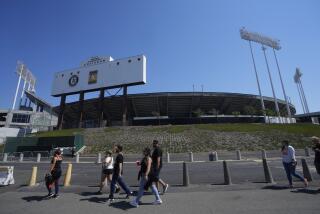Raiders Must Prove ‘Loans’ Were Just That : Pro football: Team could owe $20 million in taxes, penalties unless it can show money received was to be repaid.
- Share via
SAN FRANCISCO — A U.S. tax court judge said Tuesday that the Raiders may well owe income tax on at least $17.9 million in payments they received in the 1980s unless the team can prove that “loans” from Irwindale and the Coliseum had provisions guaranteeing repayment.
Since the Raiders repaid neither “loan,” Judge Mary Ann Cohen’s opinion seemed to put the burden on Raider owner Al Davis and team attorneys to prove what would appear to be a difficult proposition.
Cohen presided over a two-day hearing held on a Raider appeal of IRS deficiency notices on the loans and certain other IRS demands. She called for briefs on the question from both the Raiders and the IRS in 75 days and said there would be 45 additional days for responses. She said she hoped she could write her ruling by Christmas.
If interest and maximum penalties are added to a prevailing 50% tax rate at the time in question, the Raiders could owe more than $20 million, although neither side has given any precise figures in public. Raider attorney Barrie Engel scoffed at the $20-million figure as too high.
Both Raider attorney Jeffrey Birren and former Coliseum Commissioner Bill Robertson testified that in both the $10-million “loan” from Irwindale and a $6.7-million “loan” from the Coliseum Commission, there was intent to repay.
Irwindale, however, ultimately forfeited the $10 million to the Raiders when it couldn’t make good on a contract to build a stadium for the team, and the Coliseum finally forgave repayment of the $6.7 million, even though the Raiders had not lived up to what seemed to be a commitment to use the money to build luxury suites.
According to provisions of the Coliseum loan, the Raiders owed repayment only out of suite revenues beginning three years after the suites were completed.
Robertson, who negotiated the Raider move to Los Angeles for the commission, was pressed by IRS attorney David Sorensen on whether he felt this was a binding repayment provision, since the suites were never built.
“We had every intent to build the suites,” Robertson said.
Robertson’s testimony Tuesday contrasted with statements he made to The Times on Dec. 9, 1982, when he said that it was not intended that the money would ever be fully repaid. In that interview, he said the advancement of funds had been called a loan “only for tax purposes” for Davis.
An IRS auditor, Sheldon Cohen, no relation to the judge, had testified Monday that he has intermittently spent months at the Raider offices in El Segundo going over the team books. Cohen, a 28-year IRS veteran, said he is a specialist in auditing Los Angeles area entertainment firms and sports franchises.
Statements at the hearing by the IRS said that many matters have already been settled as a result of the audit, including disallowance of some team deductions for travel and entertainment expenses, gifts, and certain payments to the NFL.
Coliseum Commission President John Ferraro suggested, perhaps facetiously, Tuesday that Davis should agree even at this belated date to repay the $6.7 million.
“If he did, he’d be off the hook on that part of the IRS case against him,” Ferraro said.
More to Read
Go beyond the scoreboard
Get the latest on L.A.'s teams in the daily Sports Report newsletter.
You may occasionally receive promotional content from the Los Angeles Times.










